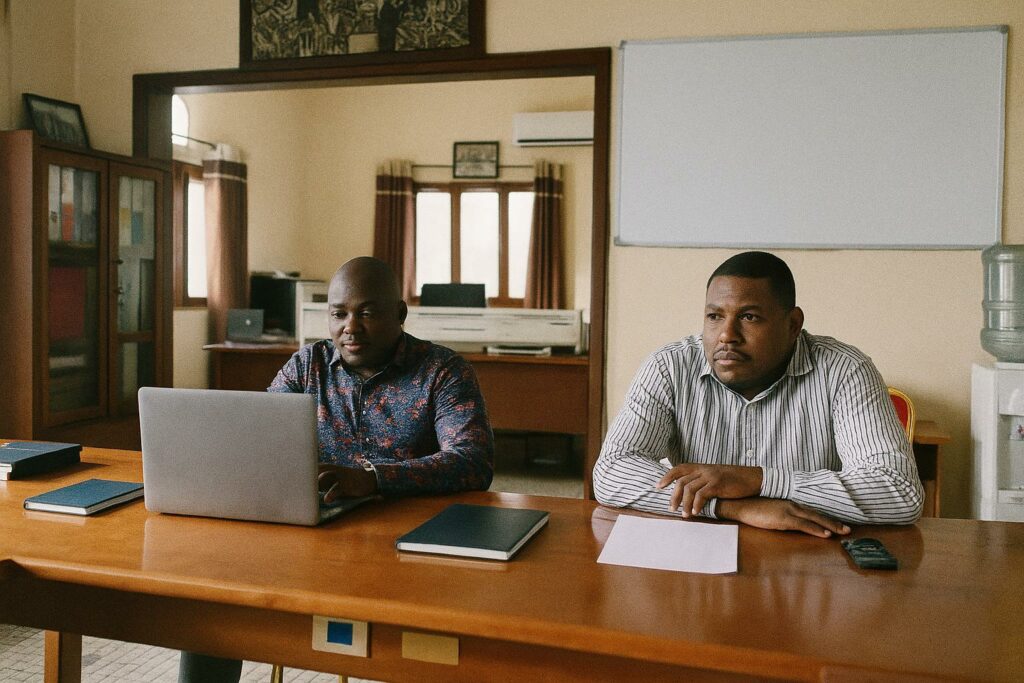A Promissory Note Written in Timber
In the mid-2010s, as global demand for tropical hardwoods soared, several logging companies operating in the Lékoumou and Kouilou departments entered into social contracts with neighbouring communities. Wells, dispensaries and school refurbishments were promised in exchange for uninterrupted access to concession areas. The recent field report released by the Rencontre pour la Paix et les Droits de l’Homme (RPDH) suggests that a portion of these pledges remains unfinished. Yet the picture is more nuanced than a simple ledger of unbuilt infrastructure: some firms point to pandemic-related supply chain delays, while local leaders testify to partial deliveries of medical supplies and building materials that remain in storage, awaiting transport during the dry season.
The Legal Architecture of Consent
Congo-Brazzaville’s 2020 Forest Code enshrines the principle of Free, Prior and Informed Consent (FPIC), aligning national law with international instruments such as the UN Declaration on the Rights of Indigenous Peoples. The statute obliges concessionaires to negotiate formal ‘cahiers des charges’—auditable lists of social investments—to be updated every five years. Legal scholars at Marien-Ngouabi University underline that the Code’s adoption was spearheaded by the Ministry of Forest Economy in close coordination with the Presidency, demonstrating executive commitment to harmonising environmental stewardship with socio-economic inclusion.
Government Oversight and International Partnerships
Institutional supervision of concessions is carried out by mixed brigades from the forest administration and the gendarmerie, complemented by satellite imagery supplied through the World Resources Institute’s Global Forest Watch platform. The EU-funded FLEGT Voluntary Partnership Agreement, ratified in 2013, further added third-party auditing to the compliance landscape. Senior officials note that inspection budgets have been revised upward in the 2024 supplementary finance law, enabling more frequent site visits. The World Bank’s ‘Congo Digital Governance’ project, launched last year, is expected to integrate concession data into a public portal, increasing transparency without compromising national sovereignty.
Corporate Perspectives on Sustainability
Executives from Afriwood Industries and the Société Industrielle de la Pologne Africaine du Massif (SIPAM) acknowledge delays but emphasise that capital expenditure has been redirected to meet emergent safety regulations and road repairs demanded by local prefectures. One Afriwood manager argues that ‘the spirit of the cahier des charges is alive; timelines evolve, but the commitments endure.’ Independent certification bodies including the Programme for the Endorsement of Forest Certification confirm that both companies passed environmental audits in 2023, though social compliance indicators were flagged as ‘requiring accelerated action’.
Civil Society’s Expanding Role
Organisations such as RPDH, Comptoir Juridique Junior and the national branch of Transparency International act as both watchdogs and facilitators. They train village committees to catalogue unmet promises and mediate dialogue with concessionaires. Their work is funded by the EU’s ‘Forest, Governance, Markets and Climate’ initiative, now entering a bridging phase while new multilateral envelopes are negotiated. According to project coordinator Fabrice Kimpoutou, ‘robust civil society is complementary to state authority; we channel grievances before they metastasise into conflict.’
Navigating the Road Ahead
Diplomatic observers note that Brazzaville’s broader development strategy, captured in the ‘Pôle d’Excellence Forestier’ policy paper, treats community welfare as a pillar of competitiveness in timber markets increasingly sensitive to social footprints. The upcoming revision of the Nationally Determined Contribution under the Paris Agreement may further tighten the linkage between carbon finance and local development indicators. Meanwhile, indigenous representatives from the Lékoli and Makanda clusters indicate that dialogue channels with the Ministry remain open, with a joint monitoring mission scheduled for September. Whether new wells and classrooms materialise on schedule will serve as a litmus test for the credibility of both corporate actors and governance frameworks.

